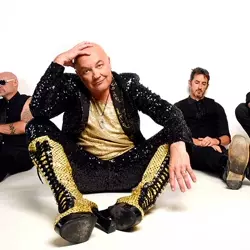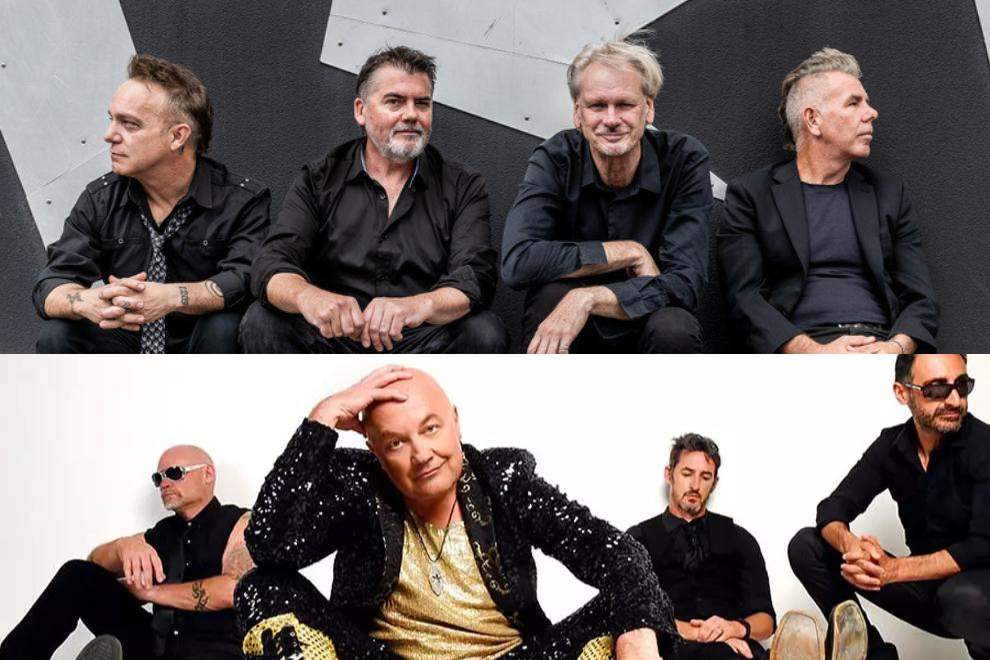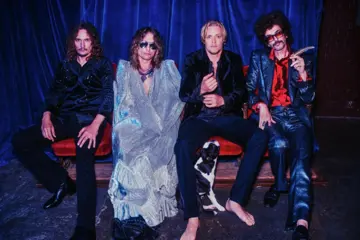 Chocolate Starfish
Chocolate StarfishWhen four of the best Australian bands from the ‘90s—Chocolate Starfish, The Sharp, Grinspoon, and Spiderbait—announced their plans to go back on the road with new music, social media went into overdrive.
The threads mostly asked: What’s so great about ‘90s music, and why is it possibly better than today’s stuff?
On their current sell-out shows, Chocolate Starfish and The Sharp have the nostalgists cheering them back. But Gen Zers are also checking them out for the first time.
Hopefully, these innocents have yet to test out ‘90s travesties such as oversized flannels, blossom hats, platform sneakers and mom jeans.
“I’m gobsmacked when I see young faces in the audience,” admitted Starfish’s singer Adam Thompson. “They didn't grow up with us; they just found us through Spotify or word of mouth. That’s exciting to me; it means the band is still growing.
“We’re not in a time warp. We’ve got a new single out called Candyman Blues, which is a hybrid of the ‘70s song The Candy Man and the groove of The Doors’ Roadhouse Blues.”
Don't miss a beat with our FREE daily newsletter
The Candy Man came from the 1971 movie Willy Wonka & The Chocolate Factory and was a No. 3 hit in Australia for Sammy Davis Jr. Coincidentally, Thompson starred in a theatre revue of the movie while at college.
“The response to the single was amazing from the first time, and it continues to grow. It’s a great hybrid, and it really works live. Next year we’re taking time off to record a new album, I got some ideas down when on holiday in Italy this year.”
In the meantime, The Sharp 2024 is showcasing a new lineup. Drummer Piet Collins and guitarist Charlie Rooke are joined by The Living End's Scott Owen on stand-up double bass and new singer Louie Lee Feltrin.
“The audience has been a bit of a mix,” reported Collins. “There are the diehard fans, of course. There are some Living End fans. Then there’s the younger crowd who have just discovered us and are getting into our sound, the look, and the live energy.
“It’s very encouraging to see new faces. We’re basically doing our first album, This Is The Sharp, in its entirety, and we’ve got three new songs, which are our stock-in-trade and are going down really fabulously.”
These will be released as an independent EP in a few months, around the time This Is The Sharp is issued on vinyl for the first time via Warner Music.
Thompson on Gen Z’s appeal to ‘90s reunions: “Their own bands don’t have many engaging frontmen or frontwomen, take risks and do wacky things because they don’t have as many pubs in which to cut their teeth and learn.”
Collins’ take on Gen Z’s interest: “Maybe they’re looking for something different. Maybe it’s our focus on a whole band rather than a solo entity, that there are real humans up there playing instruments and writing songs without AI.
“They feel a connection with this band. That was always important to us. When we came out in the ‘90s, we were never into shoegazing like the grunge bands. Each show had to be an event.”
Vibrant
The ‘90s pub culture from which Chocolate Starfish and The Sharp emerged was a vibrant one. There were scores of venues to learn in, and a triple j-fuelled crowd encouraged them to take risks on stage.
Thompson experimented with flamboyant stage costumes, sparkles, bling, feathers, tassels, and exaggerated eye makeup—anything to be gripping.
“Some of our ideas worked, and some of them didn’t,” he shrugged. “But when you take risks, the original joy of the theatre and of performing comes back to you.”
Thompson’s energy, lassoed by daily yoga and a tough physical regime, saw him develop a reputation for climbing up balconies and lighting rigs and totally vibing into the crowd’s energy.
Starfish’s lineup–Thompson, John Nixon (bass), Darren Danielson (drums), Norm Falvo (keyboard) and Zakk Zedras (guitar) – has remained virtually unchanged since 1993.
That was the year their debut single, a cover of Carly Simon’s You’re So Vain, which was meant to be just a toe-in-the-water introduction to the band, instead stormed up to No. 11. Six months later, their own Mountain, about whether to move forward like a river or stay resistant like a mountain due to pressure from lonely loved ones, went to No. 12.
Meanwhile, the self-titled debut album (April 1994) went to No. 2, with the follow-up Box (October 1995) peaking at No. 6.
The band took a hiatus in 1998, returning in 2010. Two years later, guitarist and songwriter Zoran Romic died of non-Hodgkin lymphoma. His replacement, Zedras, was on later studio albums as Spider (2017) and Beautiful Addiction (2021).
With clever use of social media (which, of course, didn’t exist in the '90s), Starfish not only reached a younger audience but also engaged them by highlighting each of their different personalities.
With 2024 being the 30th anniversary of their first hit, they first hit the stride on festivals such as Red Hot Summer Tour, The Big Red Bash, and Mundi Mundi Bash.
Now, the current three-month tour, 30 Years And Counting… switches to theatres to incorporate a 2½ hour show, which also sees Starfish serve as their own support act, doing an unplugged set with acapella singing and Thompson seated.
Then, the amps are turned up to “thunderstorm,” and the singer is back in wings and bling. Each show on the tour is different, and the songs are interchanged between the sets.
The songs also come from touring behind classic albums with challenging songs and powerful vocals, such as Meat Loaf's Bat Out Of Hell (2017), INXS's Kick (2018), and Queen’s Bohemian Rhapsody (2021).
Bat Out Of Hell was special for Thompson. It came out in 1977, the year his mother died from cancer. “Being a country boy, I found it difficult to express grief.” Its songs, such as Heaven Can Wait, Crying Out Loud, Paradise, and Praying For The End Of Time, proved his salvation.
Decades later on this tour, with the introspection and passion of someone for whom rock has played a pivotal role, Thompson leads Starfish to trigger memories for his audiences.
In each town, they play with a new gospel choir, on Motherless, which Thompson wrote about his mother’s passing.
“I’d been holding on to that sadness, and on this tour, I wanted to do that song, but not necessarily in a sad way. We only get to meet the people in the choir an hour before the show at Soundcheck.
“They all have their stories of loss, and that comes out in their performance. We all have a group hug before we go on, and they release the sadness or celebration of the people whom they’ve had passing.”
First Nation didgeridoo players are also invited to play on Mountain. Thompson has long worked with First Nation communities to close the gap.
“So many [Indigenous] people have told me that they have an affinity to that song in their journey to spirituality. What they take from the song is that it takes longer for a river to go through a mountain.
“It’s the same with [Indigenous] culture. To connect with it is not so straightforward. Sometimes you have to listen stronger and take different paths to connect with the land and the Dreaming.”
Thompson recounted one show where, during Heaven Can Wait, he noticed a fan in the third row crying.
“I wasn’t sure why,” he explained. “I thought, I need to go out there, and I need to sit next to her and sing this song.
“The walls had fallen down; she literally fell into my arms. She was in distress. I could feel it. After the show finished, we met up, and she said, I got a month to live. When you were doing Heaven Can Wait up there, I felt you knew that.
“It was an emotional moment, but it's a moment where the audience lifts me to a place where if they want to go higher, we’ll go higher.”
Spiky Topped
The Sharp burst out of inner-city Melbourne in 1990 to instant recognition with a collection of spiky-topped pop songs, an exuberant live show that included original singer/bassist Allan Catlin jumping all over his stand-up double bass, and a cartoony black-and-white image.
Piet Collins joined a year later from an ad Rooke put in Juke magazine, and after being told by the others, he had to get rid of his mullet.
Their first independent EP was quickly picked up by community radio 3RRR and 3PBS and then triple j. Warner Music came to the party. Their debut album This Is The Sharp went gold, and they were all over radio and TV.
Comedy program D-Generation did a parody of Skivvies Are Back, based on their hit Scratch My Back, gleefully referencing their black skivvies.
The second album, Sonic Tripod, was produced by US producer Rick Will (Ziggy Marley, Diesel), and saw them tour Europe and the US. The Sharp’s road schedule was frantic. They’d play 320 shows a year, seven days a week, sometimes three shows a day. On days off, they’d be travelling. The burnout was inevitable, and in 1995, they did a farewell tour.
“The schedule was very hectic. I’d come back from a tour and collapse in a heap. But no one was complaining, because it was so much fun. There were crazy out-of-control packed gigs, really loud and really sweaty. Having the crowd on your side was about as much fun as you can have.
“We loved watching the crowds enjoy themselves. It was simple sing-a-long and dance-a-long. That’s why we put the band back together, for the fun. We’re not over-thinking things here (laughs); it’s pure escapism.”
After The Sharp, Rooke gigged in low-level bands around Melbourne. Collins took a break from playing, scriptwriting for Neighbours for ten years and doing stories for the street press.
Fast-forward to last year, and Rooke was alerted to a full-length video on YouTube that The Sharp had made in the '90s for a Channel 10 show. He was impressed by how energetic and musical they sounded.
Coincidentally, he got a text from Collins: “Have you heard about this video up online?” A few more texts were exchanged. Someone suggested, “Do you want to do this again?” Allan Catlin opted to stay out.
The 2024 version is just as boisterous, with Scott Owen also recreating the double bass mounting antics. The Living End bassist had been a massive Sharp fan. He and TLE’s Chris Cheney would sneak underage into pubs and wait until The Sharp came on at 1 am.
Collins explained: “When he was 15 or 16 years old, Scott wanted to be like Alan. The idea of jumping over his bass was something he took into The Living End. For Scott, it’s a full circle. That’s what he grew up wanting to do.”
Owens’ bass has a thicker sound. Feltrin, who’d been playing around town, impressed everyone with his personality, phrasing and harmonising. Collins said, “Honestly, the band is sounding better than ever. It’s the tightest we’ve ever sounded.”
















